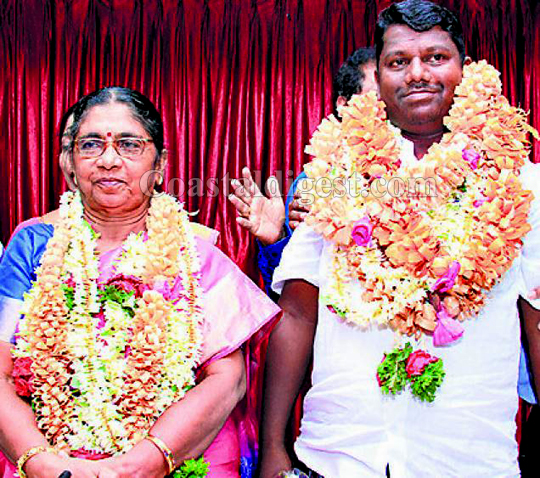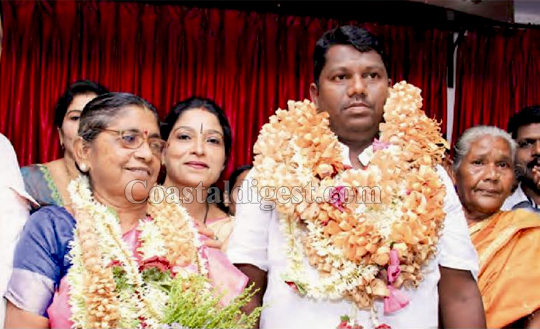Manipal, Apr 27: A man, who has worked as a security guard at the district stadium for the last 10 years, is now the Udupi zilla panchayat president! BJP members Dinaker Babu and Sheela K Shetty were unanimously elected as the Zilla Panchayat president and vice president respectively on Wednesday.

Mysuru Regional Commissioner A M Kunjappa conducted the election process. The nominations were filed by the candidates from 9.30 am to 11 am and the process of selection was held two hours later. The house comprises of 20 BJP candidates and six Congress candidates. As the Congress did not field any candidate, the electoral process got over barely within a couple of hours.
The post of the zilla panchayat president was reserved for SC candidate and the vice president post was for women. The name of the candidate for the president's post was proposed by K Babu Shetty and Reshma Uday Shetty proposed the candidate's name for the post of vice-president.
The 38-year-old Dinaker Babu said that his appointment is a testimony to the democratic values that upholds equality. Dinaker has studied till PU and was working as a driver for the project director in the zilla panchayat for four years. He has also worked as watchman for the Sports Department for 10 years. With immense happiness, Dinaker said that he had contested for the first time and has reached to the highest post.
He said that rural development is his top priority and public grievance would be taken up immediately. The zilla panchayat would become a role model for all other zilla panchayats. Nepotism, corruption and anti-poor policies will not be entertained. Funds would be utilised effectively.
A booklet on the programmes of the zilla panchayat would be brought out to create awareness among people. The zilla panchayat will chalk out permanent drinking water projects and will also give priority to the scientific disposal of garbage.
He said that he will try to create awareness on rainwater harvesting among the general public to increase the groundwater table. Percolation ponds would be dug to increase the groundwater level. Skill development programmes will be started to help the youth. Babu stressed on a need to develop taluk and gram panchayats to strengthen the three-tier system of administration.
The 68-year-old vice president elect, Sheela K Shetty, is a veteran politician and BJP leader who has become a zilla panchayat member in her fourth attempt. She had earlier contested from Kaup and Padubidri in 1995, 2000 and 2005, but had lost. An ardent Yakshagana artiste, who prefers performing male characters, Shetty says that she has authored 10 books.
Her recent work is Koti-Chennaiah, which was released in 2015. She is also the president of BJP district Mahila Morcha. She said that the assurances made in the manifesto would be realised in a phased manner.






Comments
uneducated sanghis always..... GO MATAKI JAI
Educated always says ....AAP ki jai...
This happens only In BJP. Uneducated leaders leading society.
congrats both of your, keep up the good work in udupi, surprised to c guard as a president,
Add new comment